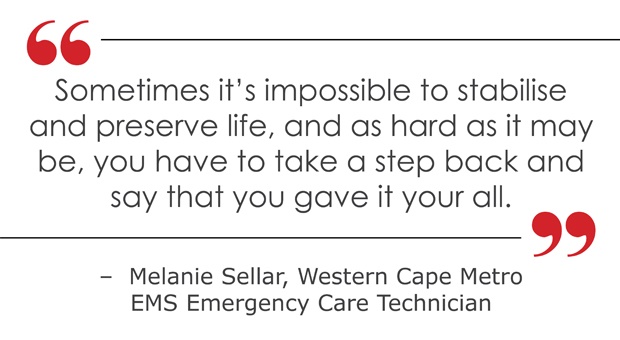South African paramedics do their utmost to uphold the high standards required not only by their superiors and international health organisations, but by themselves as well. But the grim challenges they have to face during the course of an average day make it a daunting task.
The time window of care between a traumatic event and receiving hospital care plays a major part in saving people’s lives, but when paramedics need to worry about their own safety while concentrating on saving someone’s life, things become a lot more difficult.
Recently, an ambulance was involved in an ambush after being called out to a “red zone” – an area classified as a high crime area – and even though they had a police escort, there was a shootout, and a police officer needed to be taken to hospital.
Mob justice
Melanie Sellar, 27, is an Emergency Care Technician (ECT) and operates in most parts of the Cape Peninsula, but especially in areas like Du Noon informal settlement, Hanover Park, Bonteheuwel, Kensington, Milnerton and Cape Town CBD.
Sellar first qualified as a Basic Life Supporter (BLS) in 2009 and her first experience with violence on duty was when she was in student training.
“The patient was assaulted by the community in Gugulethu and as we were busy treating and loading him, angry community members felt we should have left him so they could finish him off.
“They started stoning us and the ambulance. Luckily, we could flee the scene with only minor scratches and bruises,” said Sellar.
Paramedics are constantly in fear of their own safety when going into high crime and high-risk areas, especially while working at night or doing the graveyard shift.
Going into the red zones
Sellar and her partner experienced another incident while waiting to be escorted into a red zone.
“Out of a dark passage, two guys appeared and jumped onto the tow bar at the back of the ambulance, thinking my partner and I didn’t see them.
“Adrenaline coursing through my body, I didn’t know what to expect, so I started moving forward and picked up speed. My partner had been with me for the past three years, so he knew me well and knew he should hold on because I then stepped on the brakes.
“All we heard were some bangs against the doors and the two guys jumping off swearing and waving sharp objects at us as we sped off. We went straight to the police station to get a proper escort,” explained Sellar.
She added that incidences like these are what ambulance personnel face on a daily basis, and even more so on the Cape Flats, in gang-infested communities and townships.
While the picture is grim and many people wouldn’t want to continue putting their own lives at risk to save others, Sellar has a different outlook.
“Surely, it’s about serving the community and helping people, while doing our utmost to preserve life. I grew up in EMS and always admired my father, who is a Rescue Technician. All I ever wanted was to be like him,” said Sellar.
‘I gave my all’
When on duty Sellar regularly experiences many different incidences of trauma, and sometimes she and her colleagues aren’t able to save someone, due to the extent of their trauma.
“Sometimes it’s impossible to stabilise and preserve life, and as hard as it may be, you have to step back and say that you gave it your all. It’s no use beating yourself up, when you know you didn’t just stand there and watch. I tried and gave it my best,” said Sellar.
Cherished moments
Every trauma isn’t all doom and gloom. Sellar has helped many people, young and old, and these are the experiences she cherishes the most, even though she says it’s hard to pin-point one memorable moment.
“Whenever I have assisted with delivering a baby in the back of my ambulance or inside a home, it usually makes my day. That moment of joy and happiness when that baby gives its first cry as it enters the world is always phenomenal.
“But I also love treating geriatric patients. Sometimes all they want is company, someone to drink tea with and to reassure them. Sometimes they just need to hear they will be fine, because many of them are alone, without children or families – and it won’t hurt to spend a few minutes listening to them listening to their wisdom and stories.
“It’s these little things that make my heart smile, knowing I made a person’s day a little better,” said Sellar.
Image supplied
Stefni Herbert

 Could your daily tipple lead to obesity? There is growing evidence for a link between alcoholism and obesity, but more research is needed.
Could your daily tipple lead to obesity? There is growing evidence for a link between alcoholism and obesity, but more research is needed.  It is into these limitations around healthcare budgets and resources that the value-based care model (VBC) steps, providing an alternative stance on medical care, the patient and costs.
It is into these limitations around healthcare budgets and resources that the value-based care model (VBC) steps, providing an alternative stance on medical care, the patient and costs.



